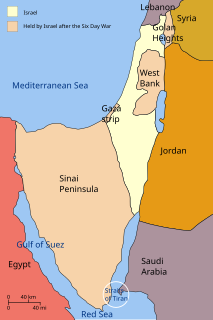Arab Palestine Organization (Arabic : منظمة فلسطين العربية) is a former Palestinian political faction. It was formed in 1969, when the Nasserist wing of the Popular Front for the Liberation of Palestine - General Command (PFLP-GC) split from the group. On August 5, official sources from the Palestine Liberation Organization confirmed that the group - led by Ahmad Zarur - had joined the Palestine Armed Struggle Command. According to a declassified CIA document, the group had around fifty members. In August 1969, the APO claimed responsibility for bombing the Israeli pavilion at the International Fair in İzmir, Turkey. [1]

Palestinian nationalism is the national movement of the Palestinian people for self-determination in and sovereignty over Palestine. Originally formed in opposition to Zionism, Palestinian nationalism later internationalized and attached itself to other ideologies. Thus it has rejected the historic occupation of the Palestinian territories by Israel and the non-domestic Arab rule by Egypt over the Gaza Strip and Jordan over the West Bank.

Nasserism is a socialist Arab nationalist political ideology based on the thinking of Gamal Abdel Nasser, one of the two principal leaders of the Egyptian revolution of 1952 and Egypt's second President. Spanning the domestic and international spheres, it combines elements of Arab socialism, republicanism, nationalism, anti-imperialism, developing world solidarity and international non-alignment. In the 1950s and 1960s, Nasserism was amongst the most potent political ideologies in the Arab world. This was especially true following the Suez Crisis of 1956, the political outcome of which was seen as a validation of Nasserism and a tremendous defeat for Western imperial powers. During the Cold War, its influence was also felt in other parts of Africa and the developing world, particularly with regard to anti-imperialism and non-alignment.

The Palestine Liberation Organization is an organization founded in 1964 with the purpose of the "liberation of Palestine" through armed struggle, with much of its violence aimed at Israeli civilians. It is recognized as the "sole legitimate representative of the Palestinian people" by over 100 states with which it holds diplomatic relations, and has enjoyed observer status at the United Nations since 1974. The PLO was considered by the United States and Israel to be a terrorist organization until the Madrid Conference in 1991. In 1993, the PLO recognized Israel's right to exist in peace, accepted UN Security Council resolutions 242 and 338, and rejected "violence and terrorism". In response, Israel officially recognized the PLO as the representative of the Palestinian people. However, the PLO has employed violence in the years since 1993, particularly during the 2000–2005 Second Intifada. On 29 October 2018, the Palestinian Central Council suspended the recognition of Israel and halted security and economic coordination in all its forms with it.
In the summer of 1970, the group attracted controversy as it, along with another Nasserist group, the Action Organization for the Liberation of Palestine, briefly expressed sympathy for the Rogers Plan - which was proposed to reduce belligerence between the Arab states and Israel after the Six-Day War. This approach was however, withdrawn. There were some reports that the controversy sparked clashes with other Palestinian factions, such as Democratic Front for the Liberation of Palestine (DFLP) and the Popular Front for the Liberation of Palestine (PFLP). The APO claimed that the PFLP had attacked their office in Lebanon. The accusation was however withdrawn at a meeting of Palestinian factions. [1]
The Rogers Plan was a framework proposed by United States Secretary of State William P. Rogers to achieve an end to belligerence in the Arab–Israeli conflict following the Six-Day War and the continuing War of Attrition. The plan was publicly proposed in a December 9, 1969 speech at an Adult Education conference.

The Six-Day War, also known as the June War, 1967 Arab–Israeli War, or Third Arab–Israeli War, was fought between 5 and 10 June 1967 by Israel and the neighboring states of Egypt, Jordan, and Syria.

The Democratic Front for the Liberation of Palestine (DFLP) is a Palestinian Marxist–Leninist–Maoist, secular political and militant organization. It is also frequently referred to as the Democratic Front, or al-Jabha al-Dimuqratiyah. It is a member organization of the Palestine Liberation Organization.









